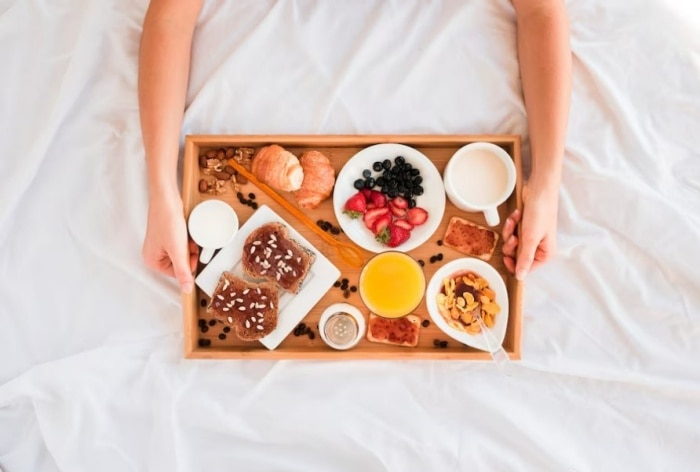Many things happen inside the body when one is asleep. Our body needs that time to rest. Therefore, it is better to boost a good sleep in priority sleep and reduce any risk to our overall health.
A full sleep of almost seven to eight hours every day is extremely important for all adults. It’s not just about the number of hours you sleep, but also about the quality of your sleep. There are health conditions that can develop due to a lack of good quality sleep. There are a number of people who will report not sleeping well or not getting enough sleep. There are several lifestyle changes that require adjustments for a better sleep cycle, however there are some solutions that lie within your kitchen shelves.
Diet plays an important role in the optimal functioning of the body. Dietary practices affect blood pressure, cholesterol weight, etc., which in turn also has an effect on sleep.
“We are finding more evidence that improving your diet can lead to better sleep,” said Marie-Pierre St-Onge, director of the Center of Excellence for Sleep and Circadian Research at Columbia University Irving Medical Center in New York, quoted by the Washington Post. “All the research points to similar findings: Foods and dietary patterns that are associated with better sleep tend to have a lower glycemic index (meaning they have less of an effect on blood sugar levels), lower in saturated fat, low in added sugars and high in fiber.”
Here are some nutrients that should be added to the diet to improve sleep quality.
- A lack of vitamin B6 has been linked to symptoms of insomnia and depression. Vitamin B6 helps in the production of the hormones serotonin and melatonin, which are important for deep, restful sleep, and also for mood.
- An iron deficiency has an effect on the quality, quantity and timing of sleep; iron also affects modulation of REM sleep. Amaranth, bajra, barley, lentils, soybeans, and dates are rich sources of iron.
- Magnesium is another crucial sleep component that helps the brain and body relax and prepare for sleep. Magnesium acts in a similar pathway in your brain as anti-anxiety drugs, so it helps your body relax and go into sleep mode. Some of the best sources of magnesium are nuts, spinach, bananas, avocados, and potatoes.
- Low blood serum vitamin D levels (less than 20 ng/mL) may increase the risk of sleep disturbances and are associated with difficulty sleeping, decreased sleep duration, and nocturnal awakenings. Mushroom, egg yolk
- Adequate intake of omega-3 polyunsaturated fatty acids (n-3 PUFAs), including docosahexaenoic acid (DHA) and eicosapentaenoic acid (EPA), is associated with better sleep quality. Ghee, flaxseeds, chia seeds, and Walnuts are excellent sources of omega -3 fats. The best sources of this B vitamin are chickpeas, potatoes, and bananas.
One path to a healthy and good sleep cycle is not just eating right, it is a combination of eating and lifestyle practices. Here are some lifestyle changes to make:
- Keep a consistent sleep schedule: Try to go to bed and get up at the same time every day, including weekends.
- Create an environment conducive to sleept: Make sure your bedroom is dark, cool, and quiet. Consider using blackout curtains, earplugs, or a white noise machine to help you sleep.
- Avoid stimulating activities before bed: Avoid using electronic devices such as smartphones or laptops before bed, as the blue light these devices emit can interfere with your sleep. Also, avoid consuming caffeine, alcohol, and nicotine before bed.
- Exercising regularly: Regular exercise can help improve sleep quality. Try not to exercise for a few hours before bed, however, as it can be stimulating.
- Practice relaxation techniques.: Techniques like deep breathing, meditation, or yoga can help reduce stress and promote relaxation, which can help you sleep better.
- Daytime naps: If you must nap during the day, try to limit it to 30 minutes and avoid doing it late in the day.
- Choose a comfortable mattress and pillows: Make sure your mattress and pillows are comfortable and supportive. If your mattress is more than 10 years old, consider replacing it.
Many things happen inside the body when one is asleep. Our body needs that time to rest. Therefore, it is better to boost a good sleep in priority sleep and reduce any risk to our overall health.
Published Date: June 7, 2023 9:35 AM IST
–>
–>
